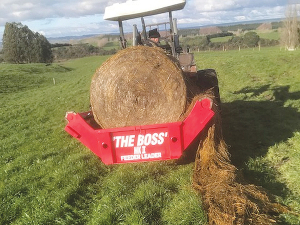With a history that saw the first Boss bale feeders built in 1999, Taupo-based Feeder Leader has built any army of enthusiastic followers around New Zealand, who rate its performance and reliability.
The Series 2 machines build on that reputation, with a design brief of not to mess with the areas that work well, rather address features or functions that might need to be improved.
Primarily designed to deal with round bales, but also capable of feeding squares with optional attachments, the Series 2 machines are lighter, weighing in at only 490kg, while also incorporating a shorter, yet steeper, feeding tray.
A new, heavy-duty fork frame features 63.5mm, solid steel tines to carry the bale cradle, with the added benefit of a new doublecatch locking system for quick demount and capture of the two modules-aided by larger diameter fork recesses.
Attention to detail sees the bale tray/cradle being fully welded, offering increased strength and durability over light-duty layouts that are held together with pop rivets. Feeder bars are also welded to the unique, guided roller chain, as are the solid tines/spikes to the box section feeder bars to promote positive movement of the bale. Featuring only four grease nipples for the whole machine, drive is direct from a heavyduty, 400cc hydraulic motor that is fully enclosed to stop any feed material wrapping around moving parts.
Elsewhere around the machine, premium Vesconite polymer bushes are well-suited to wet and muddy conditions typically found on livestock farms during winter, while also offering a typical design life of up to 10 times more than bronze bushes or bearings, requiring no maintenance.
www.feederleader.co.nz


















